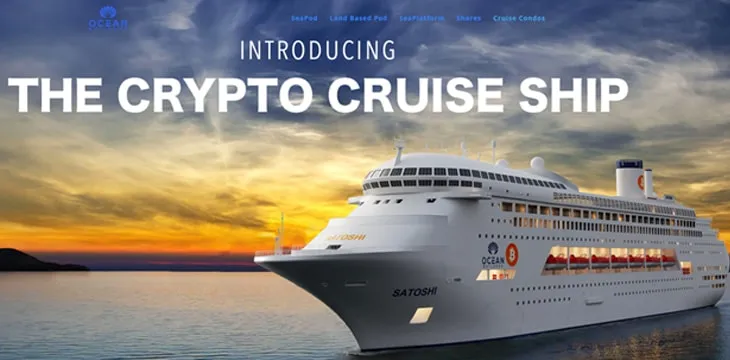|
Getting your Trinity Audio player ready...
|
There is one job BTC has always done very well: selling a libertarian lifestyle. Whether it’s to entrepreneurs, wannabe entrepreneurs, or those who just want to buy and HODL, its message promises a dream life to those who want a life of wealth and freedom far away from the clutches of government, its taxes, and its regulations. The latest is the “MS Satoshi,” a cruise ship fitted out for “digital nomads” to live, work and socialize in international waters.
Billed as “The Crypto Cruise Ship” by its planners Ocean Builders, the MS Satoshi “is a business focused environment where you can relocate your existing business, set up a new global head office, or come and start a new business and be supported in an environment of like-minded entrepreneurs.”
It invites: “everyone from digital nomads to YouTube influencers, startup teams, and established businesses are welcome with office space available to accommodate you and your team.”
Quite the lifestyle
For anyone worried that living on a cruise ship long-term might stifle quality of life more than enhance it, there are plenty of options. There’s a fitness center with yoga and guided meditation sessions, onboard health testing “using the newest cruise industry health and safety standards.” For those worried about the flu or COVID-19, “you have the option of wearing a mask, social distancing, or taking preventative doses of hydroxychloroquine.”
We’ll set aside the thought that those “health and safety standards” sound close to the kind of regulations crypto entrepreneurs and “innovators” are trying to avoid by living on a ship. Since they’re industry standards and not government-mandated, they must be OK. (Life on a cruise ship would probably be pretty intolerable for those who require social distancing, too, but each to their own.)
There are also corporate facilities like meeting rooms and a presentation theater, which can also be used for events and entertainment.
Given the ship’s name, the MS Satoshi is unsurprisingly not Bitcoin friendly but instead focuses on BTC, and Ocean Builders promises “a crypto friendly environment,” where all businesses onboard will accept BTC, U.S. dollars and other forms of payment.
The MS Satoshi project website makes a reference to “the man-made island of Venice Italy” which was once an important hub for commerce, suggesting the MS Satoshi could be something similar for the modern age. Here’s hoping cruise ship-style internet connectivity improves in the near future, or resident entrepreneurs will be doing a lot of text-based emailing.
A mobile Seastead?
Ocean Builders are supporters of the Seasteading Institute and the MS Satoshi received the endorsement of one of the Institute’s founders, Patri Friedman. Friedman, grandson of the famed economist Milton Friedman and son of hardcore anarcho-capitalist author David Friedman, has long espoused libertarian principles and the idea of living regulation-free on the jurisdictionally-ambiguous ocean.
https://www.facebook.com/patri.friedman/posts/10159115968874766
The Seasteading Institute (which also counts Peter Thiel as a founder) is a nonprofit organization that promotes projects that seek to establish permanent or semi-permanent communities in literally offshore locations. The name itself is taken from the old libertarian concept of “homesteading”, and would like to see the same principle applied to the more challenging, other 2/3 of the Earth’s surface—in an ecologically sustainable way. It supports “political autonomy” with the implication that, freed from land-based government overreach, innovation and wealth would flourish.
Ocean Builders is a company that has explored several options related to the Seasteading concept. It’s probably best-known for its short-lived 2019 experiment in supposedly international waters off Thailand. The prototype seastead was seized and towed away by the Thai Navy some months later, with the country’s government giving a strong disapproval of the project by charging its two occupants with violating Thai sovereignty and warning others against making any similar plans.
The company is currently exploring another fixed seastead construction near Panama, but apparently also sees mobile ships as another potential option. Notably, the Seasteading Institute itself disapproves of ships as an alternative to permanent structures, citing maintenance/fuel costs and environmental concerns as the main reasons:
‘Seasteading! Why not just live on a boat?’
We’re not suggesting that freedom of jurisdictional choice to locate a business is a bad idea, or that government overreach never stifles innovation and commercial opportunity. However, the idea that these challenges can be met by living and working on a cruise ship is… optimistic at best. If you’re running a startup there, it’d best be a successful one because residents will probably need to make regular visits to the mainland to avoid going completely insane.
Then there’s the issue of what happens if some government, somewhere, does object to a particular business activity being orchestrated from the MS Satoshi. Our imagination runs wild at the types of business some entrepreneurs may have in mind, even if most of them are mundane or even beneficial.
Calvin Ayre, founder of Ayre Group and CoinGeek, gave his frank opinion of the MS Satoshi idea:
“Can you imagine them all out there stuck on Gilligan’s boat all thinking they are going to just break all the laws and nothing will happen. The first port they pull into to get supplies they are screwed. Even with my fight with the U.S. in which I had international law on my side and the domestic law of what I was doing not being illegal in Antigua, etc., and still only Canada and Antigua supported me. Imagine the support these clowns would have if they had zero air cover under international or any other law. The only play here for long term success is to structure your business to work inside all existing regulations and that means using the original Bitcoin Protocol (BSV) which was specifically designed for this.”
There’s nothing in Ocean Builders’ literature that suggests the MS Satoshi is designed to help its residents break any laws. But the whole idea of seasteading is political autonomy after all, which suggests potential residents would at least like to not worry about laws when making business decisions.
Given blockchain‘s history of scams, token investments, and other half-baked financial schemes that tend to leave backers and users high and dry (if you’ll pardon the expression here) we could well see at least some from a floating ecosystem of cryptocurrency enthusiasts.
After all, there are plenty of—and far more practical—options for digital nomads on dry land already, for both the well-resourced and shoestring entrepreneurial types.
Ocean Builders will begin an auction for cabin-residences on the MS Satoshi in November 2020, and is aiming to settle its first residents in January 2021.
Just for fun: a short history of offshore utopias
The idea of building an anarcho-capitalist utopia across the waters (or sailing a mobile one) has been around for a long time—yet none have ever been able to pull it off. Those that were actually established (and we’ll be very generous with the word “established” here) never lasted long.
There’s the Republic of Minerva: an early 1970s attempt to build an island literally out of sand on a coral reef in the South Pacific. Established by Las Vegas real estate entrepreneur Michael Oliver and his friends, it was first reclaimed by Tonga in 1972, and later by the ocean.
Then there’s Sealand, probably the world’s only true libertarian seastead that still exists, and the only one to have armed and defended itself to some extent. Built on an old sea fort tower in the Thames Estuary in 1967 by Paddy Bates, it actually fended off two attempts to seize it in 1968 and 1978, after which the government mainly left it alone. Sealand partnered with Ryan Lackey’s HavenCo to rebrand as an offshore server farm in 2000, which ended after HavenCo quit in 2002. Following a fire in 2006 (the sole occupant was evacuated by the U.K. Air Force and the fire extinguished by a local fire boat) and the death of its founder in 2012, it’s now mostly abandoned. The U.K. eventually passed a law extending its sea borders that effectively claimed the tower, but Sealand is still known to issue novelty passports.
The example best-known in the cryptocurrency community is Liberland, which claims a 7-km square river island on the disputed border between Serbia and Croatia. It has at times promised to recognize BTC as an official currency, or issue its own, and there were plans for electronic voting. Living in territory disputed by two countries known to fight bloody wars over their borders is probably not the safest option, however, which partly explains Liberland’s current population of zero.
Unlike the three examples above, Ocean Builders aren’t trying to establish a sovereign state. Yet. However, the principles are basically the same, updated for the millennial always-online set who see themselves as innovator-heroes of the new economy who require total political freedom to flourish.
There is some merit in that belief, and there are also plenty of entrepreneurs who see themselves as the most righteous examples of it. Many probably are… but many are also probably not. Either way, trying to build an offshore structure or sailing a big ship right in the face of far more powerful institutions as a challenge to their authority has never been a great model for success. The phrase “pie in the sky” springs to mind, so we’ll stick with either more subtle, or more tried-and-tested offshoring options for the time being.
See also: U.S. Rep. Darren Soto’s CoinGeek Live 2020 keynote talk on Balancing Innovation & Regulation for Growth of Blockchain Technology.

 07-02-2025
07-02-2025 





